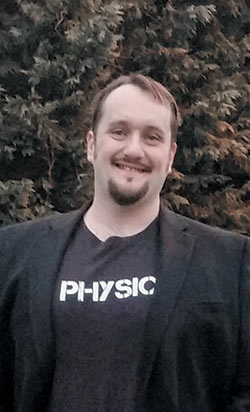Why Failure Should Be an Option
Fall
2019
Pathways - Advice from Experienced Voices
Why Failure Should Be an Option
Ari Diacou, Attorney at Law
 I love failing. When I went to law school, the first paper I wrote for a class got a 17/100. Despite my career as a professional writer, my writing was apparently terrible. Why did I go to law school? Because patent examining didn’t work out. How did I get into patent examining? Because I didn’t end up going for a PhD, like I always assumed I would.
I love failing. When I went to law school, the first paper I wrote for a class got a 17/100. Despite my career as a professional writer, my writing was apparently terrible. Why did I go to law school? Because patent examining didn’t work out. How did I get into patent examining? Because I didn’t end up going for a PhD, like I always assumed I would.
I have literally lost count of how many times I’ve had stitches, and I can tell you with absolute certainty that you should not use your front bicycle brakes while going down a hill. Also, don’t ride your bike over a street grate parallel to the openings, don’t look up to talk to a friend while using a knife, and if you’re playing catcher in baseball, wear knee pads—or at least check for glass around home plate.
I certainly would have preferred not going to the hospital to learn those lessons, but c’est la vie.
I’ve found that failing is the most effective way to learn a new skill. If you’re reading this, I assume you’re a physicist, like me. We’re a smart bunch and most likely have had many years of academic success. But if you’ve succeeded at everything, how much did you put yourself out there? While a 4.0 GPA is commendable, it might also reflect a lack of academic challenges.
Failure is a part of life, necessary to build confidence and a sense of self. It either indicates what you (currently) can’t do well or is simply the null result of an experiment you undertook. Life is a series of experiences—facing the universe, making some choices, and hoping it works out. Each experience is an experiment, but it’s not about arriving at the final answer, it’s about filling up the lab notebook.
The ancient Greeks defined hubris as the assumption that everything always works out, and the playwrights punished their protagonists heavily for such a sin—all to point out that you will, inevitably and despite your best efforts, fail spectacularly. So if, according to the Greeks, you’re going to fail anyway, why be surprised when it happens? Put failure in your learning toolbox. Seek out situations where you can fail safely.
If you’re anything like me, failing will put you in a position to succeed at things you’re unfamiliar with, and you won’t freak out if you have to learn a second (or 14th) programming language or decide to quit your job to become a lawyer.
Ari Maynadier Diacou is a physicist, lawyer, and nerd. After nine years at the US Patent and Trademark Office—where he examined optical amplifiers, LIDAR, and acoustic sensors—he decided he wasn’t going to retire as a bureaucrat and took up night school at the Catholic University of America. He works in DC as an attorney and lives near his alma mater in College Park, Maryland. The bike trail behind the headquarters of SPS National is his favorite spot inside the Beltway.
